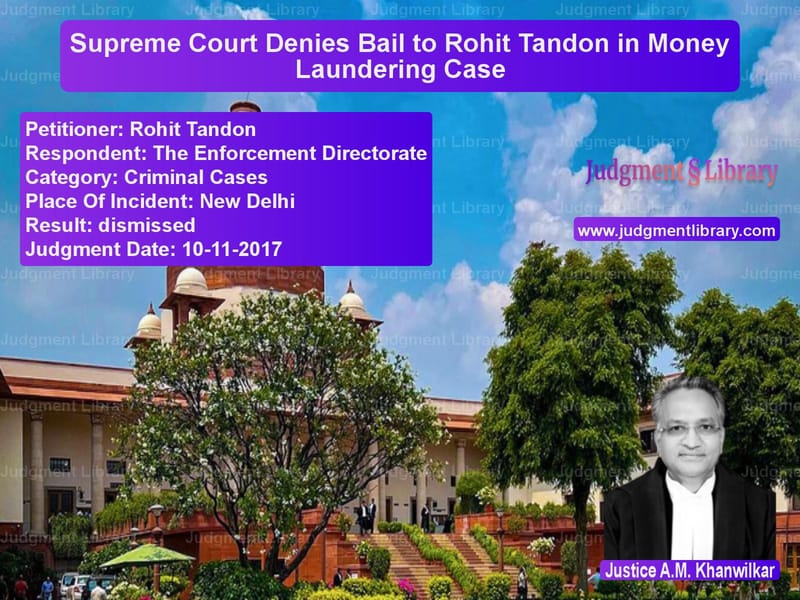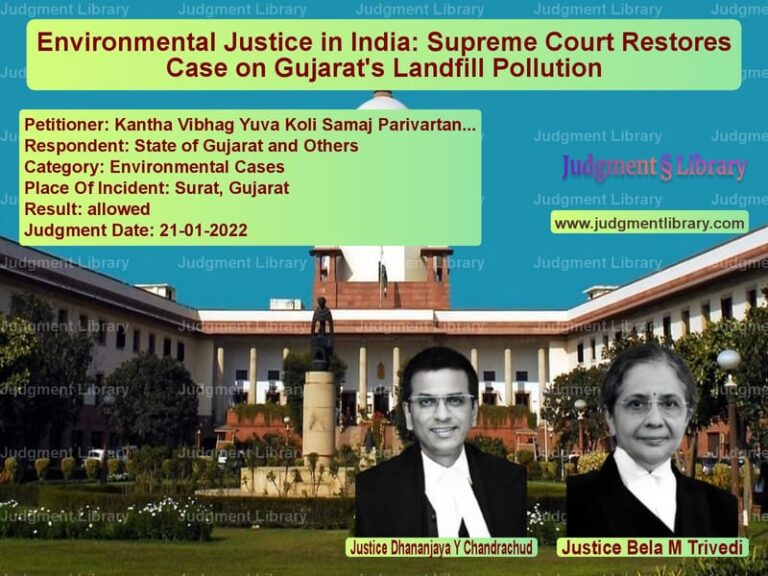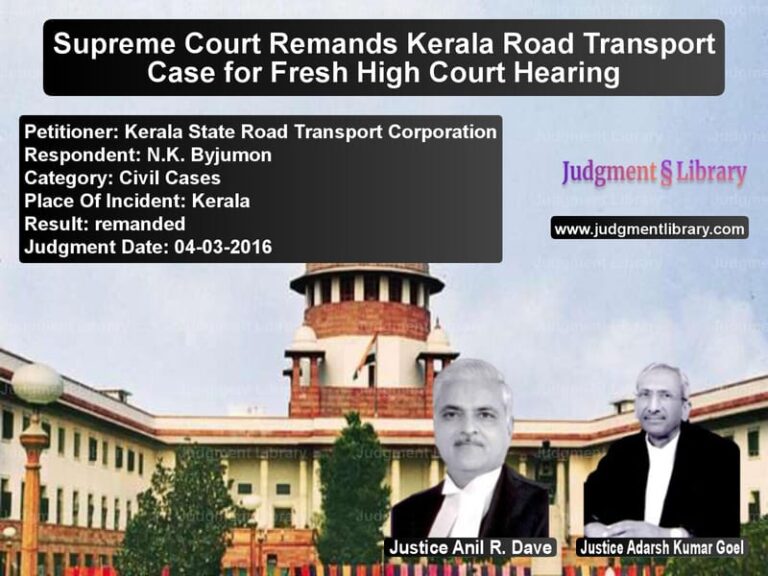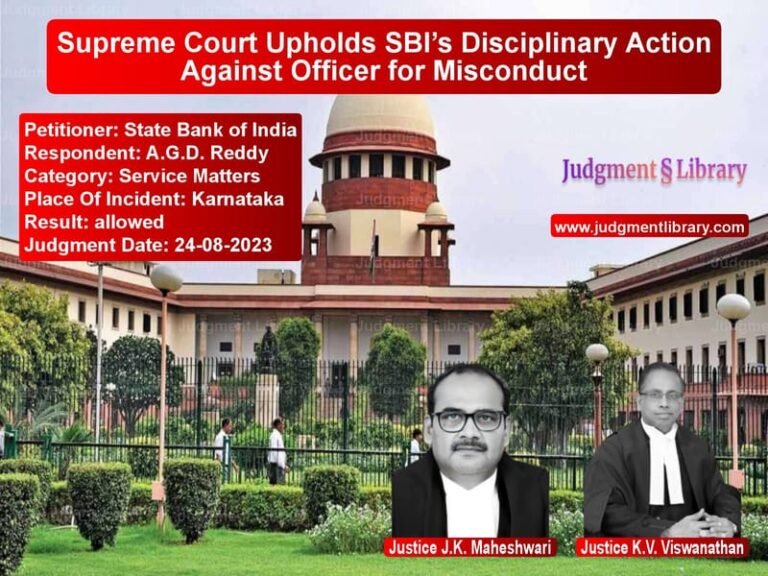Supreme Court Denies Bail to Rohit Tandon in Money Laundering Case
The Supreme Court of India recently ruled in the case of Rohit Tandon vs. The Enforcement Directorate, rejecting the appellant’s plea for bail in a high-profile money laundering case. The case, arising from the post-demonetization crackdown on illegal currency transactions, has significant implications for financial fraud investigations under the Prevention of Money Laundering Act, 2002 (PMLA).
Background of the Case
Rohit Tandon, a lawyer based in Delhi, was arrested on 28th December 2016 in connection with an Enforcement Case Information Report (ECIR) filed under Sections 3 and 4 of the PMLA. His arrest followed the registration of FIR No. 205/2016 by the Crime Branch of the Delhi Police under various sections of the Indian Penal Code (IPC), 1860, including:
- Section 420 (Cheating and dishonestly inducing delivery of property)
- Section 406 (Criminal breach of trust)
- Section 409 (Criminal breach of trust by a public servant, banker, or agent)
- Section 468 (Forgery for purpose of cheating)
- Section 471 (Using as genuine a forged document)
- Section 120B (Criminal conspiracy)
The prosecution alleged that the accused engaged in illegal conversion of demonetized currency into new notes through a complex web of fake bank accounts and shell companies.
Arguments of the Petitioner (Rohit Tandon)
- The petitioner contended that his arrest was illegal and that the Enforcement Directorate had no authority to investigate the case.
- He argued that he had been in custody since December 2016 and had cooperated fully with the authorities.
- His defense claimed that the income tax department was the appropriate agency to handle financial irregularities, not the Enforcement Directorate.
- He denied any role in the laundering of demonetized currency and argued that mere possession of cash does not prove involvement in money laundering.
Arguments of the Respondent (Enforcement Directorate)
- The Enforcement Directorate presented evidence that the petitioner had conspired with bank officials and chartered accountants to convert illegal cash into new currency.
- The agency argued that the case involved deep-rooted financial fraud affecting the country’s economy and could not be treated lightly.
- Investigations revealed that the accused was involved in handling and facilitating the exchange of Rs. 38.53 crore in demonetized notes through fake bank accounts.
- The ED further stated that financial crimes of this magnitude required stringent legal scrutiny, and granting bail would allow the accused to tamper with evidence.
Supreme Court’s Observations and Judgment
1. Financial Crimes Are a Serious Threat to National Economy
The Supreme Court reaffirmed that economic offenses have serious consequences and need to be dealt with a different approach:
“Economic offences constitute a class apart and need to be visited with a different approach in the matter of bail. Such offences affect the economy of the country as a whole and pose a serious threat to its financial health.”
2. Application of Section 45 of the PMLA
The Court emphasized that bail in money laundering cases is subject to stringent conditions under Section 45 of the PMLA. The provision states that no person accused of an offense under the Act shall be granted bail unless the court is satisfied that:
- The accused is not guilty of the offense.
- The accused is not likely to commit any offense while on bail.
3. Presumption Against the Accused
The Court noted that Section 24 of the PMLA places the burden of proof on the accused:
“Unless the contrary is proved, the Authority or the Court shall presume that proceeds of crime are involved in money laundering.”
4. Failure to Explain the Source of Cash
The Court observed that despite multiple opportunities, the petitioner failed to provide any satisfactory explanation regarding the source of the seized cash:
“The petitioner has not disclosed any legitimate source from where such a huge sum of demonetized currency and new currency notes were acquired. His silence strengthens the prosecution’s case.”
5. The Risk of Evidence Tampering
The Court rejected the plea for bail on the grounds that releasing the accused could allow him to tamper with evidence or influence witnesses.
Final Judgment
The Supreme Court upheld the decisions of the lower courts and denied bail to Rohit Tandon, ruling that:
- The petitioner had failed to prove that he was not guilty.
- The risk of tampering with evidence was significant.
- The money laundering case involved serious implications for the country’s financial system.
Conclusion
The Supreme Court’s ruling in this case reinforces the strict approach taken towards financial crimes, particularly money laundering. The judgment underscores the importance of maintaining transparency in financial transactions and ensures that individuals involved in large-scale economic offenses are held accountable under the law.
Don’t miss out on the full details! Download the complete judgment in PDF format below and gain valuable insights instantly!
Download Judgment: Rohit Tandon vs The Enforcement Dire Supreme Court of India Judgment Dated 10-11-2017.pdf
Direct Downlaod Judgment: Direct downlaod this Judgment
See all petitions in Money Laundering Cases
See all petitions in Fraud and Forgery
See all petitions in Bail and Anticipatory Bail
See all petitions in Judgment by A M Khanwilkar
See all petitions in dismissed
See all petitions in supreme court of India judgments November 2017
See all petitions in 2017 judgments
See all posts in Criminal Cases Category
See all allowed petitions in Criminal Cases Category
See all Dismissed petitions in Criminal Cases Category
See all partially allowed petitions in Criminal Cases Category







